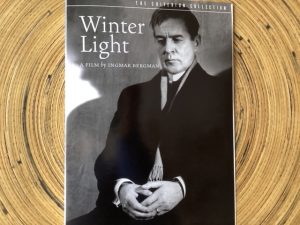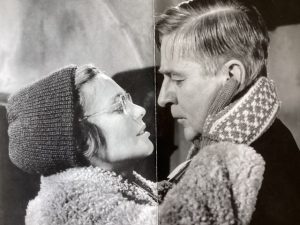Winter Light directed by Ingmar Bergman, the genius of close-ups, is, ostensibly, his most religious film, and the second of his acclaimed trilogy.
Bergman shows a rural pastor coming to terms with the hypocrisy of himself and his crisis of faith. The film is also notably about communication and the great lack of it in human relationships; punning on the word “communication”, the original title of this movie was The Communicants which also refers to faith.
The events of this beautiful black-and-white film takes place in ‘real clock time’ in the space of a few hours in one very full, complex afternoon in the lives of five related characters, making this movie a fit/ting companion chamber piece for Through a Glass Darkly, the first of the trilogy series. Sven Nykvist, who by this point, was Bergman’s go-to cinematographer, once again effectively renders the monochrome darkness of the characters’ depressed lives.
Tomas (Gunnar Bjornstrand–and the key roles are again played by Bergman’s go-to theatrical and movie casts) is a pastor in faith crisis after his beloved wife’s death, who can’t find it in himself to love Marta (Ingrid Thulin), the loving and all-in mistress who can’t find the inner strength to abandon him. Her 6-minute-on-camera soliloquy is a bold, clever theatrical device for presenting her long letter to the pastor in which she offers ‘her side of their story’.
Tomas’s religious crisis, unfortunately, is fully expressed to Jonas (Max von Sydow), a suicidal parishioner seeking counsel, who believes that China’s having the atomic bomb will end the world. The timing and choice both have tragic consequences for Jonas, father of a family of three with one on the way and his wife Karin (Gunnel Lindblom), who in contrast, is quite a character study in love, human survival and fortitude.
Rounding out the main cast is the supportive, believing hunchback church-assistant Algot Frovik (Allan Edwall), whose main scene comes as Tomas goes to preach his post-tragedy second sermon in the film. As he begins to chatter off the top of his head, he gets Tomas and the viewer to re-experience Christ’s Passion, crucifixion, and the various desertions of Christ from a modern point of view, including references to his own suffering life.
The dialogue throughout is realistically searing and challenging to not only the characters, but to the viewers as well. In a real sense, the viewers, too, experience the feelings, doubts, and misgivings of the five main characters. We also go through a similar vicarious experience of faith, doubt, belief, pessimism, and the great, ubiquitous human failure to connect with others, be they people in our lives or some higher being.
Highly recommended for people in faith crises or for men and women unable to connect meaningfully with the opposite sex.


